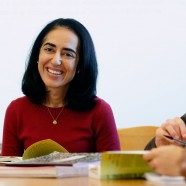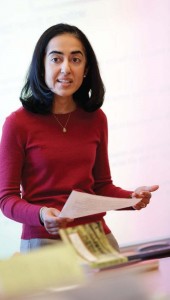
Indu Chugani is Milton’s dean of teaching and learning. In her first year here, she has focused on cultivating talent within Milton’s faculty through new professional development programming. Growth as an educator, Indu says is “constantly reviewing and defining the act of teaching, and how it is changing as we speak.” We asked Indu to consider questions about teaching that intrigue and challenge every community, and resonate at Milton.
What set of skills should I bring to the table if I want to teach at Milton today?
In a different decade, perhaps expertise in a discipline may have been enough. We need that now, but it’s no longer sufficient. You may be a brilliant biochemist or mathematician, but your mastery, and even your enthusiasm, has limited impact, unless you are aware of how a brain works to create learning. Understanding the science of learning, of cognition, is equally important as content knowledge.
Every choice that a teacher makes matters, and there are hundreds of choices in a 40-minute class. If you want to teach at Milton today, you can’t rely on intuition—even if it’s very good intuition—to navigate those decisions. Why? Because intuition alone can’t reach every learner, and reaching every learner is what talented educators do. Think about teaching 60 students every day, who have 60 different learning outcomes, and 60 sets of individual needs. Clearly, teaching responsively requires flexibility and fluidity, and connecting with multiple learning styles simultaneously. There is nothing static or formulaic about what talented teachers do: our work is dynamic.
A teacher needs to have real empathy for young people. He or she must be attuned, as in literally “tuned in,” to them. It’s like having antennae that continually pick up what teenagers are saying, how they’re behaving. Can you use what you see and hear to inform yourself about where they are and what they need? Today’s teacher is also inherently a researcher, mining the data that is readily available from students for what it can tell us, and making changes in practice based on those findings.
Digital competence is a baseline skill, too, along with a wide and deep awareness of the world. A teacher must create structures—design opportunities—that scaffold the content and create experiences that engage students, all kinds of students, and allow them to craft their own understandings of material.
 Why is it so important to tap into research about cognitive development? Is the latest research “secure,” or do you anticipate that it will change?
Why is it so important to tap into research about cognitive development? Is the latest research “secure,” or do you anticipate that it will change?
The research about how children learn has roots in theories that are not new; they were advanced by Piaget and Dewey and others before them. These theories assert that students who engage with material and construct their own understandings significantly intensify their learning. The change is in the quality of the data. Over the last 15 years, use of the MRI—watching the patterns in how children’s brains light up—has strengthened the research. It’s fair to say that we now have even more affirmative, concrete data on how what we do either activates or deactivates certain parts of the brain. We can’t ignore the imperative to focus this data on the craft of teaching.
What will keep teachers teaching over time, rather than leaving the field?
Every semester, every week, every day is different because we not only teach our disciplines, but also our students. Although teaching is cyclical, in the sense that you may be managing roughly the same material year after year, ultimately you never do things the same way because the people “in the room” are different. Each new learner causes a healthy disruption in the cycle, a need to check in and potentially revise. Teaching is restrategizing, reimagining and reconstructing continually, to make sure that you provide the right opportunities for students to connect with the material. For me, that is the joy of teaching. That is what keeps people engaged over the long term: it’s working with all your capacities at their fullest, continually. You can’t plateau as a teacher.
You’ve said that professional development, the chance for growth over time, is a key factor in recruiting talented teachers and winning their long-term commitment. You’re not talking about evening meetings with guest speakers. What does serious professional development look like?
Most importantly, effective professional development directly improves student learning in measurable ways. It is rooted in faculty becoming students of their disciplines and their craft. It relies on gaining the skills to use feedback, and not simply student surveys. Plenty of data for fruitful analysis are easily available to teachers: a few minutes of video taken on a smartphone; ten minutes of in-class dialogue, recorded on the same smartphone; a careful review of what a series of tests or assignments show.
Professional development happens both within and outside the School. The most compelling professional development happens collaboratively, in teams, and publicly. Research continues to show the potency of teacher-based teams, and working this way requires particular skills that I hope I can help the faculty develop and use. I’m excited about vetting tools and protocols that will help them work with others to assess their particular, individual effectiveness, class by class. Together, we need to address issues like, What are core practices that should characterize all teaching? How do you conduct a study of your own practice? How do you figure out what your impact really is? How do you isolate practices or behaviors that cultivate student learning, and those that impede it?
Ultimately, teachers become researchers themselves, and build analysis and reinvention into their professional personae. I’m excited about working with teachers at every experience level to develop habits of mind that allow them to see what they’re doing in ways they haven’t seen before.
How will most schools need to change if they want to attract and retain the most successful teachers?
Becoming known, far and wide, as an organization that cultivates talent is important, and it is going to become more important. Today, people with talent can find or create so many ways to use those talents. They can launch start-ups, establish charter schools, set up nonprofits. If schools don’t tap into that talent, by making growth and engagement part of the core experience, we’ll make ourselves extinct.
What do you mean when you say that every course must be relevant to students’ lives?
Teaching a course is really designing an experience that allows students to apply concepts in the course to the world around them. It’s learning about the Civil War by practicing what an historian does to think about the Civil War, for instance. It’s a structure that allows them to practice what it means to be a mathematician, or a scientist, or a musician. For example, in my American Lit class we read Huck Finn and used the text to identify the rhetorical techniques Twain uses, such as exaggeration, verbal irony, dramatic irony, a child narrator. When we finished reading the book, I asked my students to write a satire in Twain’s style about a societal flaw or problem that each of them thought needed exposure. Kids wrote about the college admission process, parental attitudes toward college, gender issues, bullying, and many other issues, but the larger point is that they did so using Twain’s techniques. Every society needs good satirists.
Why would someone choose to teach at Milton? And how would you like to answer that question in five years?
Talented teachers choose Milton because we so clearly take the craft of teaching seriously here. Teachers know that they’ll grow professionally at Milton; they will cultivate their talents among peers who care intensely about teaching. They will work with some of the most exciting, engaged, diverse students anywhere—students who will help them fully realize their potential as educators.
My vision is that we at Milton cultivate a dynamic, organic learning organization where we are responding to living forces within every single class period. I’m confident that we can be our own think tank, and learning lab, where all that assessing and recreating not only goes on continually, but also has a dynamism of its own. It’s a place where teaching means reengaging, and that process not only cultivates talent but brings joy.
We need to do that with and for one another. We need to model the behavior we most want our students to adopt.
xxxxxxxxxxxxx
Indu’s role at Milton is rooted in the Strategic Plan, which prioritizes student experience in and out of the classroom. The Strategic Plan names professional development—“providing both the tools and the support for teachers to excel at their profession”—as an essential component of our commitment to students and to the quality of our work with them.
Indu joined the Milton faculty last July, from the Winsor School in Boston, where she taught English, created innovative courses, and with English and history teachers, developed an interdisciplinary global studies program. She was named the Virginia Wing Outstanding Teacher in 2007. Indu chaired Winsor’s Teaching and Learning Committee, which led professional development on teaching practices and technology integration; she also managed new faculty orientation. As a co-chair for the Skills and Instruction arm of Winsor’s strategic plan, Indu generated, prioritized and implemented goals for the plan, “Learning in the 21st Century.” Prior to Winsor, Indu was an English teacher and dorm parent at Exeter. She began her teaching career in Roswell, Georgia, at Centennial High School.
Indu has long studied the art of teaching. Her involvement in programs, projects, presentations and conferences about teaching parallels her time in the classroom. From her first encounter with education courses in college, particularly her student teaching, Indu knew that her career needed to couple work with students and work with teachers. She has been immersed in the scholarship and dialogue among educators about student learning and teacher practices; at the same time, she has taught, mentored, and led the development of innovative curricula.
–CDE



